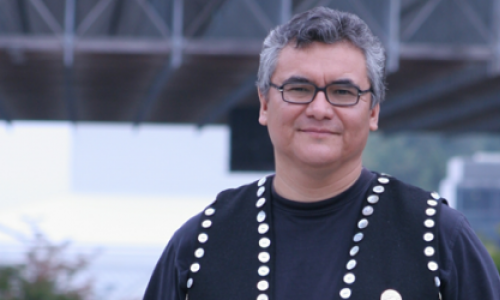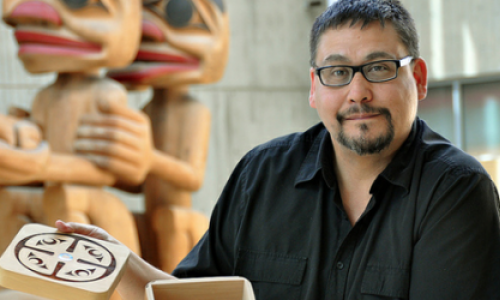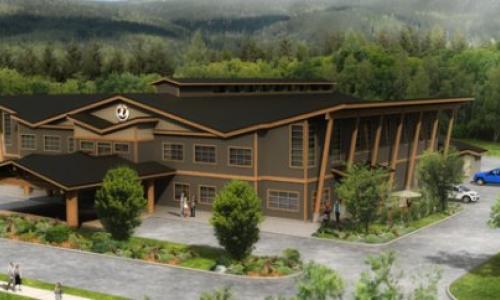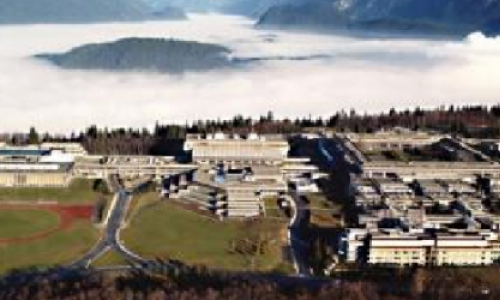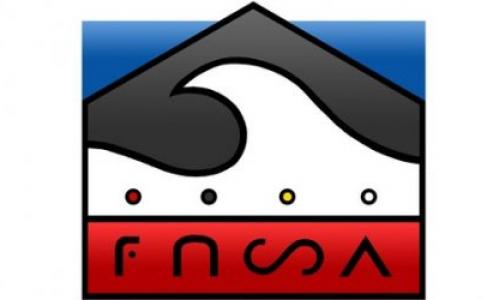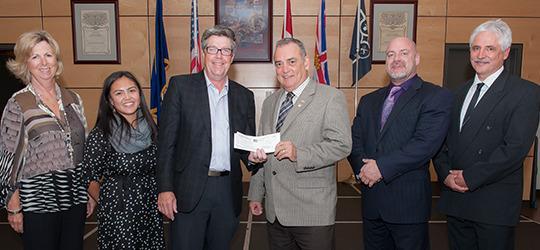
In March of this year I was asked to participate in a tour of the SFU campus. As an Indigenous Student Ambassador with the recruitment department, one of my duties is to introduce prospective and new students, as well as, other interested parties to SFU’s Aboriginal resources on campus. The tour I was invited to attend was with Joe Shayler representing UA Local 170 (The United Association of Journeyman and Apprentices of the Plumbing and Pipefitting Industry of Canada and the United States) and John Mutton, President and CEO of Municipal Solutions.They were interested in donating to support SFU’s Indigenous students. Both Joe and John were friendly and relaxed and expressed a genuine interest in what SFU had to offer students. They listened intently, met many staff and students, and told stories about their own interests. Joe was so engaging and I could see that he loved what he was doing. He reminded me of someone’s Mosom; gentle, kind and full of stories. John was equally engaging and expressed enthusiasm over many of SFU’s resources. Since the tour John now sits on the steering committee and has taken a serious interest in SFU as a whole.
I was very lucky to have met them and been given the opportunity to show them the value of Indigenous services. They have since donated $100,000 to SFU and this donation is going to help us build a gathering space, which is essential for Aboriginal student success. I feel such gratitude for these two men. They have taken the time to educate themselves about the life of an Aboriginal student, and what they don’t know, they just ask. In my humble opinion, there is so much misunderstanding and fear about offending others that we often remain quiet and ignorant rather than just asking questions. Joe and John ask the tough questions in order to really learn and it is reflected in their own work with the UA.
I was interested in understanding just what the UA is, so this summer I went on a tour of the UA Piping Industry College of BC (UAPICBC). This college is a “state of the art facility. The 70,000 square foot space includes ten classrooms, six labs, one mock-up (practical application simulator), and a fully equipped shield metal arc/oxyacetylene welding facility” (Booklet). Alex MacDonald and John Mutton showed me around the college. There was more to see then I had expected, as most of their training is hands on so they have many different simulators for a variety of skillsets. Alex told me about his experiences with some of the Aboriginal students on campus, and his desire to see them succeed was apparent. I was most impressed by the efforts they have taken to understand Aboriginal people and provide them with the resources they need in order to support their continued success.
From the UAPICBC Booklet
The UAPICBC has organized a series of interactive workshops to promote essential skills and apprenticeship training for potential Aboriginal apprentices. With baby boomer retirements looming and threatening to create major skill shortages, there is an urgent need to train tomorrow’s workforce today. Aboriginal people will be an important part of the future labour force and the UAPICBC is contributing efforts to ensure they have the skills needed to succeed
For this initiative, the UAPICBC engaged a variety of Aboriginal and mainstream partners, including PTPASEP, PRASEP, Skeena Native Development Consortium, and the Industry Training Authority (ITA). The ITA and particular Gary McDermott, Director of Aboriginal Initiatives, has been very supportive of this initiative. Two of the ITA’s main objectives in the Aboriginal Initiatives Program are:
Preparing Aboriginal Apprentices—research barriers, challenges, and successful models of preparing Aboriginal people in the skilled trades such as Essential Skills assessment and upgrading, foundation training, and other models.
Employing Aboriginal Trades People—research barriers, challenges, and successful models for the recruitment, apprenticeship completion, and employer/industry retention of Aboriginal people in the skilled trades.
It has been thrilling for me to see this put into practice and to see that supporting Aboriginal learners and employees is possible through the proper initiatives and tools. The UAPICBC provides its Aboriginal students with things they may need along the way, such as childcare and transportation. By taking a serious look at some of the barriers facing many Aboriginal people, it allows the UAPICBC to provide appropriate solutions to these issues. Meeting Joe and John, touring the UAPICBC and knowing that because of their committment to the advancement of Aboriginal people, the Indigenous students of SFU will be able to create an awesome space, has been amazing. The blessing of a gathering space is heartwarming and humbling, as I know it will nurture our learning and continued growth.
I’m grateful when I see that there are changes taking place in the world. So often I miss the forest for the trees and I need to be reminded that there are people like Joe, John and many others at the UA who don’t want to change us, but rather want to learn how to accommodate those cultural differences that are essential to our well-being. With a little effort and a lot of faith I can see that it is possible.











